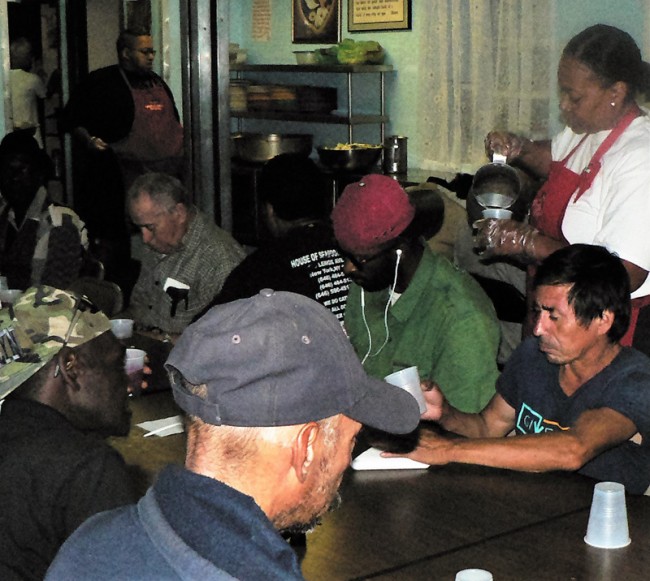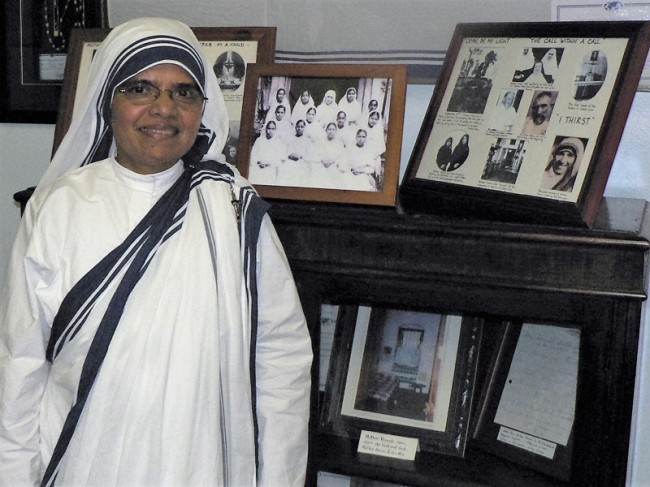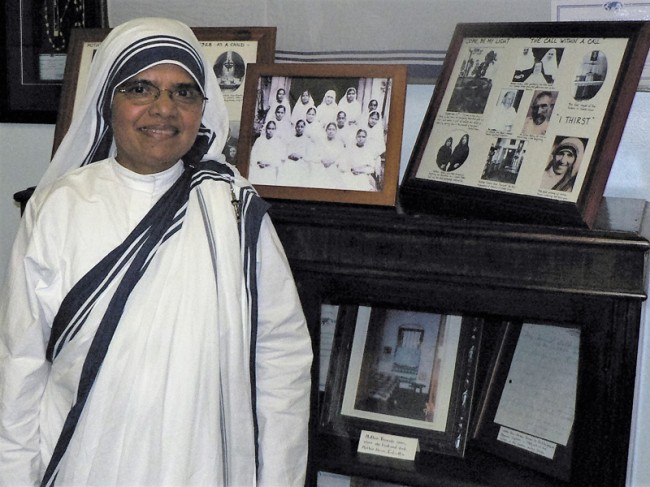New York, Sep 4 (IANS) Mother Teresa, who is being declared a saint by Pope Francis on Sunday, has been hailed as the “Saint of the Gutters of Kolkata”. But her sisters find they are needed as much in New York, the richest city of the US.
Suffering and want know no national boundaries. And neither do compassion and charity as the international brigade of Mother Teresa’s sisters bear witness here.
Barely five miles from New York’s fabled “Billionaire’s Row” overlooking Central Park, sits the nation’s poorest area, the South Bronx where Park Avenue sheds its glitz for grit. Clad in blue-bordered white cotton saris, Mother Teresa’s Missionaries of Charity toil there tending to New York’s unwanted, the homeless and the rejects.
“We do feel Mother Teresa’s presence here in these sisters,” Nancy Rivera, who grew up in the area, told IANS. Rivera has since moved up and now lives in a well-off area, but still returns to her childhood neighbourhood to volunteer at a church near Mother Teresa’s sisters.

She said that when she sees them pick homeless people off benches on the streets to clean and feed them, she senses “the invaluable presence of Mother Teresa”.
She added, “I am one of the lucky ones to have met her in person.”
Considered the poorest area in the US, census figures have pegged the percentage of people below the poverty line in the South Bronx at 38 per cent — and it rises to 49 per cent for children.
Sister Regipaul, the head of the convent in the South Bronx, said that 20 sisters from the US, Canada, Poland, France, Argentina, the Netherlands and India work there running a shelter for 18 homeless men, a soup kitchen that provides ready meals for the needy and a service that distributes food supplies to about 200 poor families, many of them immigrants adrift in an alien land.
Another convent in Manhattan’s Harlem has a shelter for homeless women with a soup kitchen, and in Brooklyn the sisters provide a home for unwed mothers, she said.
A more remarkable service is the home run by the sisters for AIDS patients in downtown Manhattan. The sisters were among the first to step in to care for AIDS patients in the early 1980s when the newly-discovered disease spawned fear and prejudice.
The sisters clean, feed and provide for the patients at the centre, Regipaul said.
At the sisters’ Bronx centre on Saturday, Preston Radcliff, recalled his own spiral into drugs and alcohol and his redemption.
“They being near to God brought a special awakening in me and I have stopped all that,” he told IANS. “I love this place.”
The Missionaries of Charity are organised into three regions in the US. In the East Coast province headed by a Korean, Sister Rose Clara Lee, over 100 sisters work in 17 centres, three in Canada.
Mother Teresa began the New York mission in 1971 and the late Sister Nirmala, who succeeded her, worked here for a while.
As in India, the sisters say they do not work to convert people and only see Jesus “in the broken body” they help as Mother Teresa once said.
Regipaul, who hails from Thrissur in Kerala, worked in Kolkata and Mumbai before coming to the US 35 years ago. A difference between India and here is that the poverty of the spirit is greater in the US, she told IANS.
“In India, it is easier,” she said, adding “If the people are hungry you give them bread to eat, and it satisfies the need. Here the poverty is greater; they need food, but they are also very lonely. The loneliness is greater suffering than poverty.”
The sisters work in “little ways” to help alleviate this malaise of a fragmented society, Regipaul said. They organise group activities for them to socialise, visit the isolated and shut-in people to talk to them and cook for them, she said.
But like in Kolkata, here also they come across people marked by the deepest stigmata of physical suffering.
Regipaul recalled the case of a man with maggots crawling over parts of his body who was being chased by fear-stricken people in a nearby park. The sisters cleaned him up and cared for him.
Like in India, the sisters follow an austere regimen that includes not watching television.
But on Sunday they have a special dispensation to watch a live telecast of Mother Teresa being sainted, Regipaul said. “It will remind us that our mother waiting for us in heaven.”
The inequalities of the US burst out starkly while emerging from a short subway train ride from the city centre to the outposts of neglect in the South Bronx and Harlem, the racially-segregated, poverty-stricken areas that home to African-Americans and Latinos.
Asked about the inequalities, Regipaul with the equanimity of Mother Teresa and charity towards all brushed it aside and spoke of only the good.
“The rich people are very generous and they volunteer to work with us” at the soup kitchen and the shelter, she said. “They humbly do all the work, they sweep the floor, wash dishes, they clean.”
“Americans are great people,” she said. “And the Americans volunteering to work with us are White, Black, Latino, Indian, Chinese, Korean, African — people of all ethnicities who make America.”
On her day off on Saturday, Police Captain Rachel Evans was volunteering with her husband, Jose Sanchez, at the soup kitchen. She said they were inspired by Mother Teresa’s sisters “to help the people who have no place to eat or to live”.
In spite of the vaunted government programmes for the poor and claims of politicians, poverty persists in the richest nations.
“To help the poor, you need a warm hand, not a politician,” Rivera said of the difference she sees Mother Teresa’s sisters make.
But Mother Teresa has herself had run-ins with New York’s iron-fisted bureaucracy and petty politics. In 1989, she proposed converting two abandoned buildings into shelters for homeless men, where they would be prepared for life in permanent housing.
First, the local politicians opposed the plan. She overcame them and got the project moving.
The next year, though, the city administration insisted that she had to install lifts in the building. The ascetic nun opposed it as a costly luxury in a two-storey structure and the unmoving bureaucrats and politicians defeated her plan.






